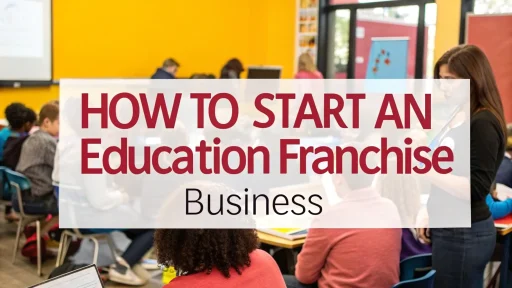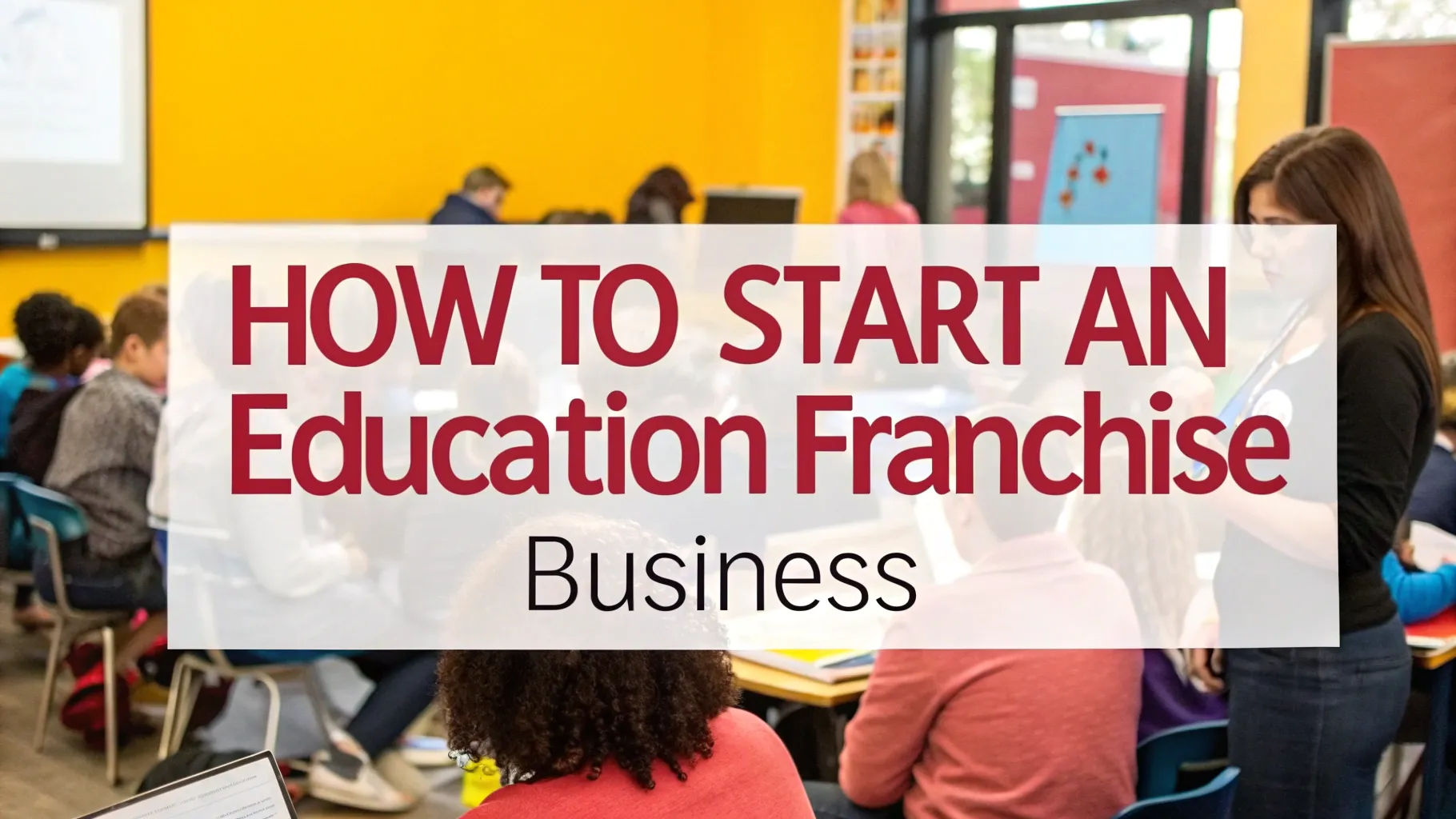The demand for quality, structured, and affordable learning experiences has increased in an era where education is rapidly evolving. The education sector is booming in India and around the world. From K-12 tutoring and preschool learning to test preparation and skill development, it’s a booming industry. One of the best ways for aspiring entrepreneurs to get into this sector is through an education franchise business.
This guide will walk you through the process of starting a successful franchise in education, from understanding the business model and choosing the best brand to executing the setup strategy.
Why Choose the Education Franchise Business?
A franchise education business offers a unique combination of commercial opportunities and social impact. Entrepreneurs don’t only make money, they also play a vital role in shaping the minds of young people, empowering youth, or promoting academic success.
The following are the key advantages:
- Low-risk entry: Proven model with established brand trust.
- Break-even faster: Due to the existing market presence and demand.
- Franchisors offer training and support, including curriculum, technology platforms, and operational guidelines.
- Scalability: Start small and then expand as regional success is achieved.
Franchising is a great way to take advantage of this growth, especially in countries such as India, where education expenditures continue to increase. This allows entrepreneurs to leverage the growth without having to build a brand from scratch.
Related: Top 18 Industrial Business Ideas for Startups and Entrepreneurs
Market Potential and Growth Prediction
Global education is predicted to grow from USD 10 trillion in 2030 to over USD 20 trillion by 2030. Private education and supplemental education are gaining momentum. The edtech sector and private tutoring are growing in India at a CAGR between 14-16%. This is fueled by the digital transformation, as well as increased parental investment into early learning, exam preparation, and job-related skill development.
Key segments seeing rapid growth:
- Preschool education is driven by the demand for early child development.
- K-12 tutoring & test preparation: Specially for NEET JEE, CUET Olympiads, and Olympiads.
- Online learning and coding schools: post-pandemic boom.
- Vocational education and skill-based training: Emphasis on employability and upgrading skills.
Franchises in the education sector are a great opportunity for the future, with a constant demand, recession-resistant, and multiformat potential (online, hybrid offline).
Selecting the Right Education Franchise
It’s crucial to match your skills and interests with the franchise type before you start.
1. Preschool Franchise
This segment is ideal for those who are passionate about early childhood education. This segment is dominated by brands like EuroKids and Little Millennium. Segment requires a physical setup, staff training, and parental engagement.
2. Centers for K-12 Coaching and Tuition
Focuses on academic support at the school level. Franchises such as Aakash BYJU’S, Allen, or Career Point serve students in classes 6-12. Subject expertise and solid operations are required.
3. Competitive Exam Coaching
NEET, JEE, and other exams like UPSC, SSC, and Banking are in high demand. Brands such as FIITJEE or Testbook provide both online and offline models.
4. Edtech/Online Learning Franchise
Low overheads, tech-driven, and scalable. This space is dominated by STEM franchises like WhiteHat Jr., Cuemath or Vedantu.
5. Skill Development/Vocational Training
Focused on employment and government-aligned. Ideal for Tier-2 or Tier-3 cities, where students require career-ready skills.
Related: Education Industry – The Fastest Growing Sector, Worldwide
How to start an education franchise business
Step 1: Self-Assessment and Business Planning
Take a moment before diving into the world of education franchising to evaluate your interest in the sector. Do you enjoy working with parents, students and educators? Are you willing to dedicate your time and effort to a business that provides a service?
It is also important to evaluate the resources that you have available, both financially and operationally. Decide on the educational segment that you will focus your efforts on–preschools, coaching, test preparation, or vocational training. Clarity helps you select a franchise aligned with your abilities, market needs, and long-term objectives.
Step 2: Research franchise opportunities and shortlist brands
Start researching education franchise brands once you have decided on your direction. Search for brands with a proven track record, scalable business models, and a good reputation of supporting franchisees.
Study their market presence, the franchise kit, the curriculum structure and technology support. The majority of leading education franchises offer orientation sessions and provide proposal decks. Use these resources. Ask about the break-even point, marketing responsibilities and student acquisition support.
Step 3: Understand and finalize the terms of your legal agreements
Once you are confident about your decision, finalize the franchise agreement. This is a formal contract that outlines the terms of your partnership–territory rights, franchise fees, revenue sharing, brand usage rights, and operational responsibilities.
Review the contract carefully, ideally with a legal adviser. Be sure to read the terms and conditions of any renewal, such as training schedules, royalties, or exit clauses. Do not rush this step. This document will define your rights and responsibilities for years to come.
Step 4: Install Your Education Center or Platform
In the setup phase, your plans become a reality. The location of your physical center is crucial, whether it’s a preschool, coaching or hybrid. Select an area that is easily accessible, has high visibility and is close to residential areas or schools.
Franchisers will typically provide guidelines for layout, branding, and IT infrastructure specifications. Equip the classrooms where necessary with furniture, digital resources, and age-appropriate learning tools.
Step 5: Hire staff and attend training
The right team will make or break your project. You will need teachers, academic coordinators, and occasionally admin or tech staff. Most franchises will help you with templates for recruitment, interviews, or shortlisting.
All staff, especially teachers, must attend training sessions provided by the franchiser before classes start. These sessions include curriculum delivery, classroom control, student engagement and technical knowledge (for edtech model). These sessions will ensure operational alignment and clarity.
Step 6: Start marketing locally
Your local marketing will be crucial in attracting the first group of students.
To build credibility, organize demo sessions, parent workshops, or open house events. To spread awareness, use local influencers or school partnerships, print ads, digital campaigns, and/or print advertisements. Use special offers and referral programs to generate buzz within the first 60 days.
Step 7: Focus on retention and manage day-to-day operations
Once your system is operational, you will be focusing on delivery, satisfaction and growth. Make sure that the learning of students is consistent and that teacher performance is monitored regularly. Also, take parent feedback seriously.
Deal with administrative issues proactively, whether it is fee collection, technical glitches or holiday planning. It’s not only about teaching that makes a successful education franchise. It’s also about managing a service you can trust.
View our Handbooks on Education Business, Educational Institution, Engineering, Dental
Common Challenges – How to overcome them
- High level of competition: Focus on parent relationships, service quality and differentiation.
- Teacher attrition: Provide performance incentives and growth strategies.
- Admission season dependency: Run multiple batches (e.g., summer camps, crash courses).
- To maintain brand consistency, follow training and auditing mechanisms to the letter.
- Compliance with local regulations: Comply with licensing laws, safety laws, and the norms of your local education board.
Franchise vs. Independent Education Business vs. Franchise: Which is better?
| Criteria | Franchise Model | Independent Business |
| Brand Trust | Immediate | Needs to be Built |
| Curriculum | You can also find out more about the Providen | Must be developed |
| Marketers | Shared with Brand | Your full responsibility |
| Tech & Training | Included | Outsourcing or building |
| Cost | Medium to High | Variations are common |
| Flexibility | Moderate | Full control |
A franchise model is a good option for first-time business owners. It offers support and faster execution.
For more information, check this video
How NPCS Can Help
Niir Project Consultancy Services supports entrepreneurs who are looking to launch education franchise businesses. They provide Market Surveys and Detailed Techno-Economic Feasibility Reports that are tailored for the education sector. These reports cover the entire process, raw materials required, infrastructure and layout plans, and future growth potential. NPCS’s vast expertise helps aspiring business owners to evaluate their idea, reduce risks, and make informed choices.
Find Best Idea for Yourself With our Startup Selector Tool
Final Thoughts
A franchise in education can have a positive impact on the community and be financially rewarding. India’s education industry is ripe for growth through franchises, thanks to a growing middle class, rising demand, and an expanding digital reach.
It’s important to choose the right brand and be hands-on in your operations. You should also build strong relationships with students, parents, and staff. Education franchising is a great way to achieve long-term success, whether you are targeting coaching classes, skill centers or preschools.







